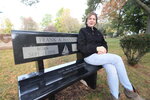Gloria Coppola never stops looking for connections that will answer questions.
In this case it is the disappearance of Frank Hanson Jr., 16 who lived in Cranston and was soon to move to Warwick …
This item is available in full to subscribers.
We have recently launched a new and improved website. To continue reading, you will need to either log into your subscriber account, or purchase a new subscription.
If you are a current print subscriber, you can set up a free website account by clicking here.
Otherwise, click here to view your options for subscribing.
Please log in to continue |
|


Gloria Coppola never stops looking for connections that will answer questions.
In this case it is the disappearance of Frank Hanson Jr., 16 who lived in Cranston and was soon to move to Warwick where his father was building a house. Frank was last seen about 7:15 p.m. at Henry’s convenient store on Broad Street near St. Paul Church where he saw Ken Dooley. Ken was working that night at the store owned by Henry Derderian.
Frank had spent the day on the water crewing for Herb Browne, who had the reputation of one of the top sailors on Narragansett Bay. They had won the day’s regatta run by Edgewood Yacht Club. There would be an awards ceremony and dance that night.
But as Coppola relates and as reported by Dooley who went on to become a Providence Journal reporter and author, Frank never made it to the awards event. He just disappeared.
The date was July 12, 1947.
Coppola visited Rhode Island last week to stop at the Pawtuxet Memorial Cemetery where Frank’s parents, Frank and Anna, are buried. The granite headstone looks as new as if the burial had taken place last week. It had grayed and was etched by lichen when Coppola located it more than a year ago. She offered to clean it. Steve Douglas, superintendent and Myra Durfee, secretary, at the cemetery told her not to use chemicals. The cemetery took on the job restoring the stone to its original luster.
In his more than 30 years at the cemetery, Douglas said Coppola is the first person to request a head stone for a deceased person who was not part of her family and she had never known. Douglas said he has no contact information for members of the Hanson family.
Coppola had hoped to have a stone with Frank’s name placed next to his parents and was willing to pay for it. However, she was told that wouldn’t be possible without approval of the Hanson family. To date she hasn’t obtained that.
What compelled her to retrace the steps of Frank Hanson all these years later and to acknowledge he lived?
A partial answer can be found in an interview published by Project Jason, The Voice for the Missing, on January 13, 2006. In Coppola’s words, “Growing up, I always thought I'd become a teacher. As high school graduation neared, I was looking into becoming an airline stewardess! I figured that I should get a couple years of college, so I looked into the curriculum of a nearby community college. The school had a good criminal justice program, and as I always had an interest in homicide since I was a kid, I enrolled in college.”
Coppola provided additional insight as she warmed her hands around a cup of hot coffee at the Pawtuxet coffee shop Beans and Buns Saturday morning.
“It’s never too late to do the right thing,” she said.
It is an underpinning theme to her 35-year career in law enforcement that started with the Niskayuna Police Department in Schenectady County, NY, and ended in June 2015 as a Major Crimes Investigator in New York State Police (NYSP) Bureau of Criminal Investigation. She would still be working there if it wasn’t for mandatory retirement at 60.
According to a profile from The American Investigative Society of Cold Cases, Coppola worked many levels of police investigation and specialized in False Allegation investigations; was a member of the 1994 Lewis Lent (child serial killer) Task Force with the FBI, Massachusetts State Police, New York State Police, and Pittsfield (MA) PD.
“ She still continues to consult pro-bono with Massachusetts State Police regarding Lent. Throughout her career, Gloria has instructed over 1,000 new officers and supervisors at the New York State Police Academy, Zone 5 Training Academy, and NYS Division of Criminal Justice (DCJS). “
She currently provides training pro-bono to the Zone 5 Training Academy regarding managing cold case investigations, and biases in missing person investigations. She was also the National Missing and Unidentified Persons System (NamUs) case manager in the Major Crimes Unit. Gloria has received numerous commendations throughout her law enforcement career.
After retiring, Coppola became a member of the a National Cold Case review committee.. On Nov. 15, 2019 she read Dooley’s story in the Providence Journal. “It was touching,” she said, and because it mentioned areas she had become familiar “it really drew my attention.” Her research led her to the Pawtuxet Memorial Cemetery, and the grave of Frank’s parents.
Coppola pulls a timeline of activity from a binder containing copies of Providence Journal and Cranston Herald articles and photos from the days following Frank’s disappearance. Her timeline starts on the morning of July 12, 1947 and ends on July 26, 1947 when three women reported seeing a body in the Pawtuxet River and a water search was resumed as reported in a story Dooley wrote and was published Nov. 15, 201. Much of the timeline is taken from Dooley’s story. There is also reference to her interview with Herb Browne who told her police visited the yacht club on July 12. He told police he had last seen Frank two to three hours ago.
Coppola had hoped to interview Browne again, but he has since died. She has reached out to Dooley who is in the midst of writing a book and to date has not provided additional information surrounding Frank’s disappearance or efforts to locate him at that time.
Dooley’s account recalls how Frank would use an abandoned trolley trestle of the Buttonwoods line to cross the Pawtuxet River. It was speculated he had fallen and hit his head. A search of the river banks and the river was conducted by the Boy Scouts and divers, but nothing was found.
Coppola applauds the effort, saying deployment of all forces immediately following a disappearance or incident is critical to solving a case. As Dooley documented reports surfaced on the night of July 12 and reported by the Cranston Herald on July 17 that a woman had seen Frank hitchhiking near Rhodes Avenue that night. Frank’s mother discounted the account claiming her son wouldn’t hitchhike.
Coppola smiles as she tells the story. She has found during numerous investigations, parents frequently believe they know their children, but don’t. She also knows from her work that making connections and building relationships are keys to solving cold cases. She briefly recounts interviewing a imprisoned convicted serial murderer and over multiple interviews that he had committed more murders than he had confessed to, thus solving cold cases.
Coppola notes police followed up on a report that Frank talked about being stowaway on a tanker that set sail the night he disappeared from the Port of Providence. The vessel was contacted by radio. A search of the boat failed to find Frank. Perhaps Frank was picked up and was the victim of foul play, maybe as first thought he fell from the bridge over the Pawtuxet or maybe as also speculated he wanted to leave behind his family and Rhode Island.
“It is a case that most likely will never be solved,” says Coppola .
Yet she now has hope of finding him. She praises Cranston Police Chief Colonel Michael J. Winquist for entering Frank’s information in the national database of missing people called NCIC (National Crime Information Center) by law enforcement. She is hopeful of obtaining DNA from a member of the Hanson family so that it could be compared to that of unidentified remains held by the state.
“There’s a chance now (of finding Frank), you never know…you could find a bone officially being him,” she said.
Connecting with the Hanson family could also lead to the placement of a stone next to that of Frank’s parents. But should that never happen, Frank hasn’t been forgotten.
The cemetery identified property across the street from the Hanson grave where a stone could be placed. At Myra Durfee and Steve Douglas’ suggestion and with their assistance, Coppola picked out a black granite bench that in addition to Frank’s name appropriately features a sailboat.
Why would a retired law enforcement officer from New York, who is now looking to move here to “get the homicide darkness out of my mind,” do such a thing?
“It’s never too late to do the right thing,” she says
Comments
No comments on this item Please log in to comment by clicking here